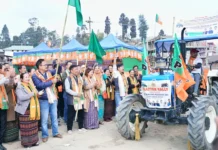[ Karyir Riba ]
ROING/CHANGLANG, 6 Aug: The Idu Mishmi Cultural and Literary Society (IMCLS) in Lower Dibang Valley HQ Roing has expressed vehement objection to the demand made by the ANSU and the ANYA for repealing the Arunachal Pradesh District-Based Entrepreneur and Professional (Incentive, Development & Promotion) Act, 2015.
“This Act has ensured equitable and fair participation of all the communities in the state in matters of the state’s developmental activities, thereby helping economic and social upliftment of all the communities in the state. The Act even provides fair opportunities, right down to the gram panchayat level of each district of the state, ensuring equal participation of local entrepreneurs in each and every district of the state.
“After the passage of this Act, Dibang Valley and Lower Dibang Valley districts have witnessed the growth of numerous local entrepreneurs, otherwise dominated by entrepreneurs from other far-flung states. Therefore, if this Act is tinkered with, it will have far-reaching effects, detrimental to all the communities across the state,” the IMCLS said.
“The IMCLS has no issues with the area-centric development demand of the ANSU and the ANYA, except for the Act stated above. We urge the state government to prioritise the development and wellbeing of the state, ensuring ‘sabka saath sabka vikas’,” it added.
The Tirap, Changlang and Longding People’s Forum (TCLPF) has also strongly opposed the demand for repealing the Act.
Claiming that “ninety per cent of the state’s population is satisfied and happy with the Act,” the forum appealed to the government to “stand with the majority people of the state.”
It said that, with the enactment of the APDBE&P Act, the local entrepreneurs are getting benefits and enjoying the fruits of economic development in every assembly constituency in the state.
“The Arunachal Pradesh District-Based Entrepreneur and Professional (Incentive, Development & Promotion) Act, 2015, was enacted to provide an incentive to ensure greater participation by district-based entrepreneurs and professionals as part of the government’s policy, thereby facilitating decentralisation of developmental activities with greater participation of the unemployed people from nook and corner of the respective constituencies, districts and the state to build a society of people with uniform social and economical status in the state to secure equitable distribution of state’s developmental work among different categories of entrepreneurs in project work,” the forum said in a release.
It added that, “before the enactment of the APDBE&P Act, such state largesse in the form of contractual benefits used to be regulated by a few syndicates, controlling from the state capital, as a result of which local unemployed youths of the districts would not even get to participate in the tender process for the work located in their areas and constituencies.”




